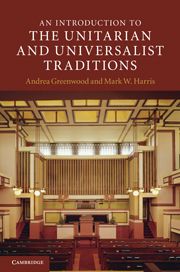Book contents
- Frontmatter
- Contents
- Acknowledgements
- A note on names
- Chapter 1 Introduction
- Chapter 2 Beginnings
- Chapter 3 Great Britain
- Chapter 4 From revelation to reason
- Chapter 5 From reason to intuition to freedom
- Chapter 6 A religion for one world
- Chapter 7 Congregational polity
- Chapter 8 Worship
- Chapter 9 Sources of faith
- Chapter 10 Science and ecology
- Chapter 11 Architecture, art, and music
- Chapter 12 Education and social justice
- Chapter 13 Current issues, new directions
- Selected bibliography
- Index
- References
Chapter 9 - Sources of faith
Published online by Cambridge University Press: 05 June 2012
- Frontmatter
- Contents
- Acknowledgements
- A note on names
- Chapter 1 Introduction
- Chapter 2 Beginnings
- Chapter 3 Great Britain
- Chapter 4 From revelation to reason
- Chapter 5 From reason to intuition to freedom
- Chapter 6 A religion for one world
- Chapter 7 Congregational polity
- Chapter 8 Worship
- Chapter 9 Sources of faith
- Chapter 10 Science and ecology
- Chapter 11 Architecture, art, and music
- Chapter 12 Education and social justice
- Chapter 13 Current issues, new directions
- Selected bibliography
- Index
- References
Summary
On the eve of the gathering of the General Assembly of the Unitarian Universalist Association (UUA) in Boston in 2003, Boston Globe writer Michael Paulson declared, “Words of ‘reverence’ roil a church,” that is “not sure how it feels about God.” The President of the UUA, William Sinkford, had provoked a debate by suggesting that the Association needed to reverse its drift away from the “language of reverence,” and begin to “name the holy.” Events were precipitated when David Bumbaugh, a professor at the Meadville Lombard Theological School in Chicago, wrote an article in Religious Humanism, called “Toward a Humanist Vocabulary of Reverence.” Bumbaugh sensed that the time had come for religious liberals to lay down their defenses against mainstream religion: “We have manned the ramparts of reason and are prepared to defend the citadel of the mind…But in the process of defending, we have lost the vocabulary of reverence, the ability to speak of that which is sacred, holy, of ultimate importance to us.” When Sinkford spoke of his own conversion from atheism to theism, some members felt like he was suggesting that the denomination should begin to use traditional language as an expectation of membership, and it was even erroneously reported that Sinkford had proposed the word “God” be added to the denomination's Principles. Humanists and atheists panicked that the denomination would lose its eclectic theology. Furthermore, there were others who feared that Sinkford was suggesting the use of this language for public relations purposes, so that Unitarian Universalism would appeal to more mainstream believers.
- Type
- Chapter
- Information
- An Introduction to the Unitarian and Universalist Traditions , pp. 166 - 184Publisher: Cambridge University PressPrint publication year: 2011

